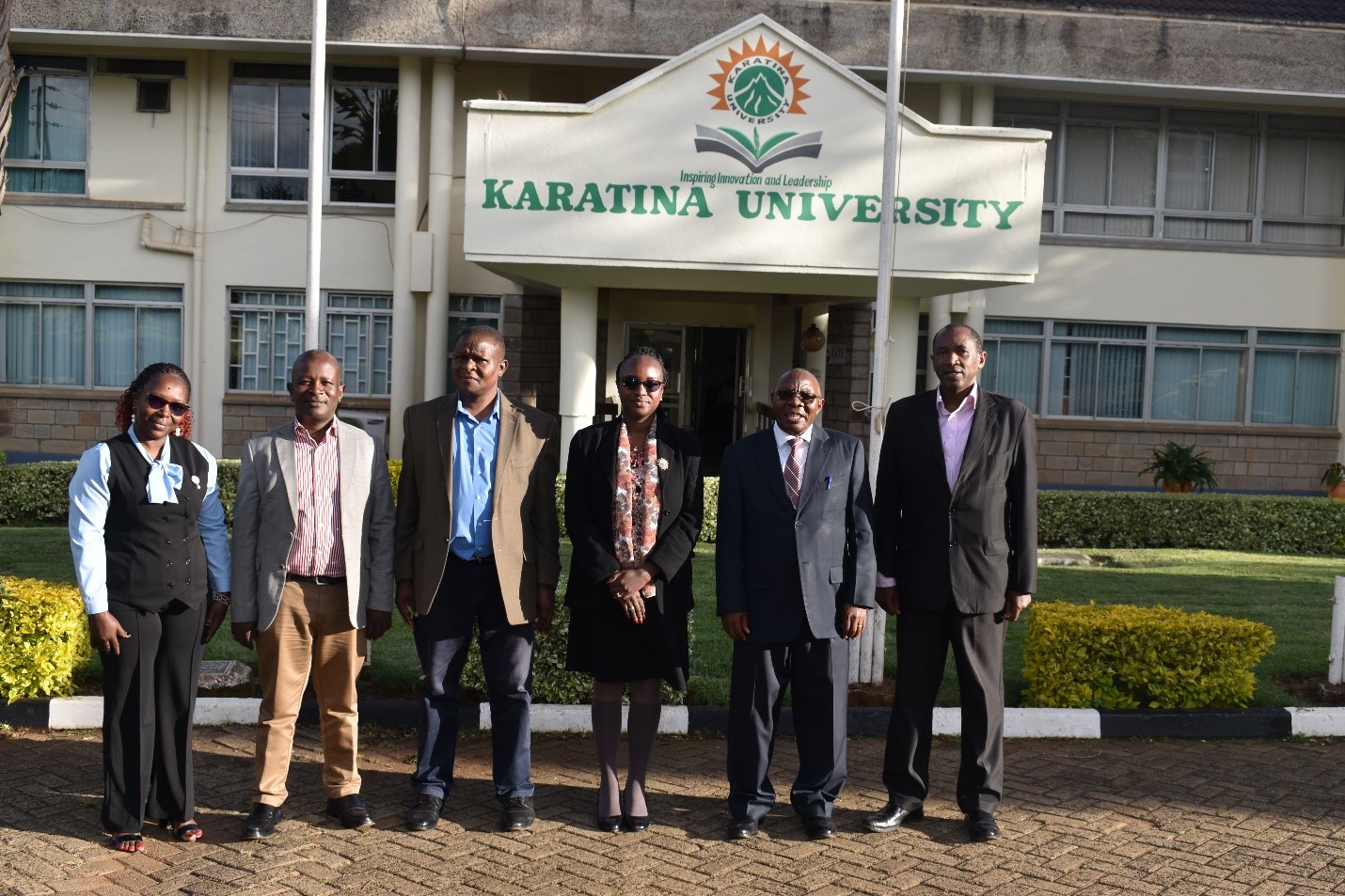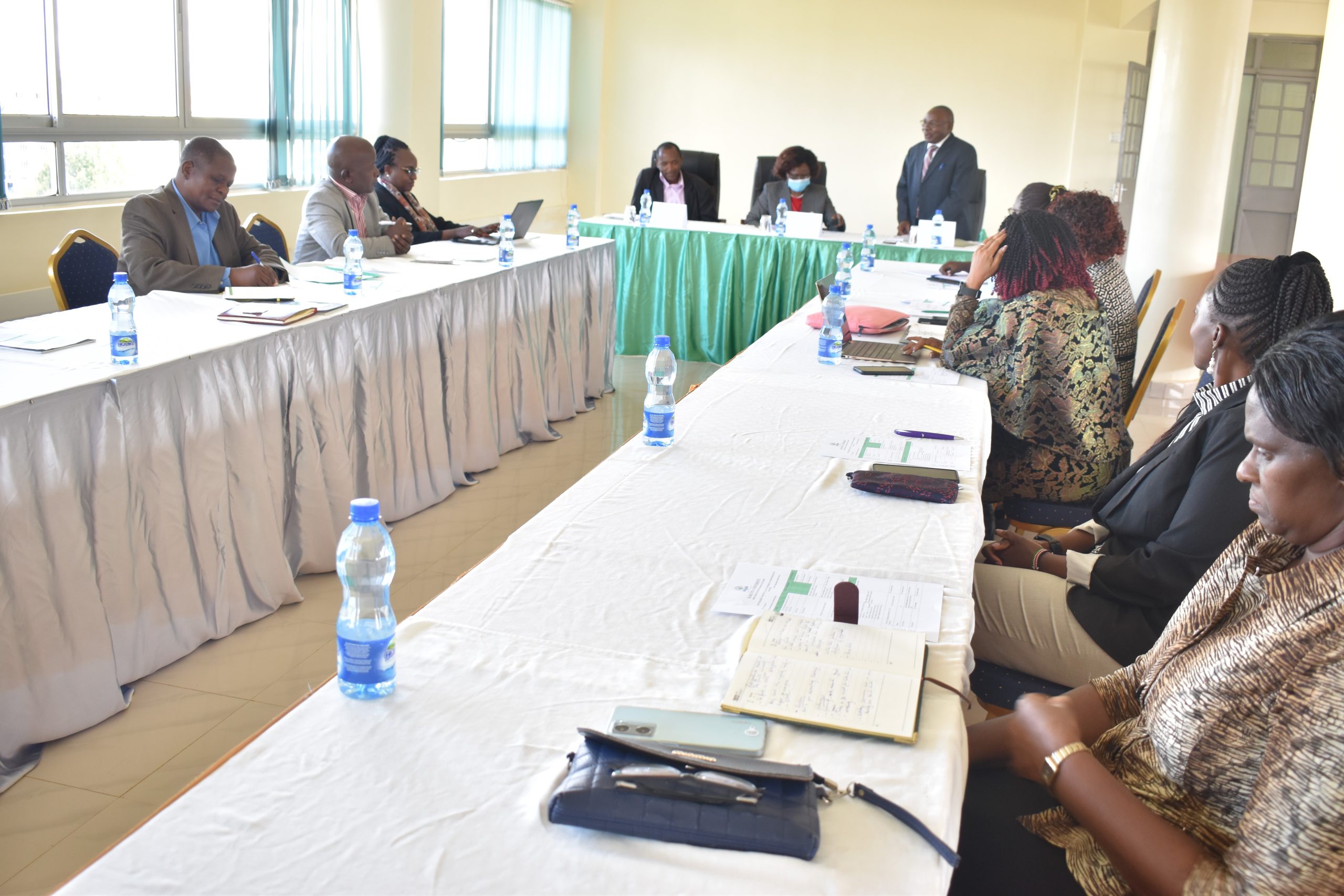
The team from St. Paul’s University together with the Director, Postgraduate Studies, Prof. Charles Ngugi
Thursday, 27th April, 2023, saw the Directorate of Postgraduate Studies host a team from St. Paul’s University who were on a benchmarking visit on the management and administration of Postgraduate studies. Led by their Deputy Vice Chancellor in charge of Academic Affairs, Prof. Peter Ngure, the delegation was received by the Karatina University Deputy Vice Chancellor (Academic, Research and Student Affairs), Prof. Peninah Aloo-Obudho and the Director, Postgraduate Studies, Prof. Charles Ngugi.
A brief history of the Directorate of Postgraduate Studies was shared highlighting that Postgraduate student population has been increasing from the time the Directorate was established to the current over two hundred (200) students taking PhD and Masters Courses. The Directorate largely oversees the implementation of policies and procedures aimed at ensuring quality of Postgraduate programmes. It works in collaboration with Deans of Schools who assist in coordinating all the Postgraduate matters from the time students are admitted to graduation. The Board of Postgraduate Studies, whose membership are representatives from the Schools of the University, is charged with ensuring, among others, that Graduate programmes are initiated and maintained, qualified students are attracted into these programmes, high level research at the Postgraduate and Post-doctoral level is maintained, students receive quality supervision, studies are completed in the stipulated time and research findings are disseminated to the users so that they are of benefit locally, nationally, regionally and internationally.

DVC (ARSA), Prof. Peninah Aloo-Obudho, chairing the meeting
The University has Doctorate and Masters programmmes in various academic disciplines. PhD studies take a minimum of three (3) years and a maximum of six (6) academic years. The programmes consist of course work examinations and thesis as per the prescribed curriculum. Masters programmes, on the other hand, take a minimum of two (2) years and a maximum of four (4) academic years. Masters programmes in all Departments consist of course work and examinations thesis or project as per the prescribed curriculum. Inasmuch as Postgraduate students belong to the respective Schools, the Directorate regulates and oversees the implementation of these standards. On appointment of Postgraduate supervisors, the Board of Postgraduate Studies ensures that supervisors are competent in the subject area in which the student proposes to work as per the topic and concept paper. The appointed supervisors guide the students throughout the research exercise and maintain regular and effective contact with the assigned student as required in the Rules and Regulations Governing Postgraduate Studies. The supervisors are also encouraged to meet regularly with the students.
A number of policies guide the conduct of Postgraduate studies in the University. The Directorate adheres to, among other, the Rules and Regulations governing Postgraduate Studies, Postgraduate Students Handbook as well as the Guidelines for Proposal and Thesis Abstracts. These documented policies guide the Directorate in carrying out its day to day operations. The Directorate has also put in place a support system to minimize dropout rates. It has in place a tracking tool which measures the progress of students by ensuring that student records are well monitored from the date of admission to graduation. This tool makes it easier for supervisors to monitor the progress of students within the stipulated time. In addition, the Directorate regularly holds webinars, seminars and consultative meetings for both Postgraduate supervisors and the students. These meetings are usually organized to allow quality interactions among students and their supervisors to ensure quality research work is achieved. The Board of Postgraduate Studies also holds regular meeting to review students’ abstracts, titles, supervisors and Board of Examiners. In case of any complaints or challenges, the University in general, and the Directorate in particular, is always keen to address any issues relating to postgraduate programmes. Challenges or complaints by Postgraduate students and supervisors are resolved immediately at the Departmental/School level.
Perhaps one of the critical roles of the Directorate is in how it handles research and how impactful the research output is to the society. The Directorate ensures that the Postgraduate students choose topics that are relevant to society. Webinars and seminars encourage demand-driven research topics that can address issues of the society particularly education in the region and environment focusing on agricultural products. This is because the University is located in an agricultural zone. The Directorate also ensures that Postgraduate research conforms to all relevant Karatina University policy documents such as Code of Conduct and Ethics for Karatina University Staff, Intellectual Property Rights Policy as well as the Research and Innovation Policy.
The fruitful discussions also brought to the fore other emerging issues that can help strengthen Postgraduate Studies in Kenya. Due to changing technologies and increase in diversity, the Directorate encourages Postgraduate students to widen their scope of study by training them on ICT skills especially in the current situation where most organizations are aiming at reducing cost. Students are also allowed to present their proposals/thesis virtually, thus, making it convenient for them without having to travel to Karatina University. The Directorate also organizes trainings that help the students to sharpen their minds in dealing with emerging issues such as the COVID-19 pandemic and the change of education curriculum in Kenya. It also encourages and mentors students to produce original and quality research by putting measures in place to curb plagiarism in academic research and other scholarly work. The University also offers part-time jobs to students such as teaching.